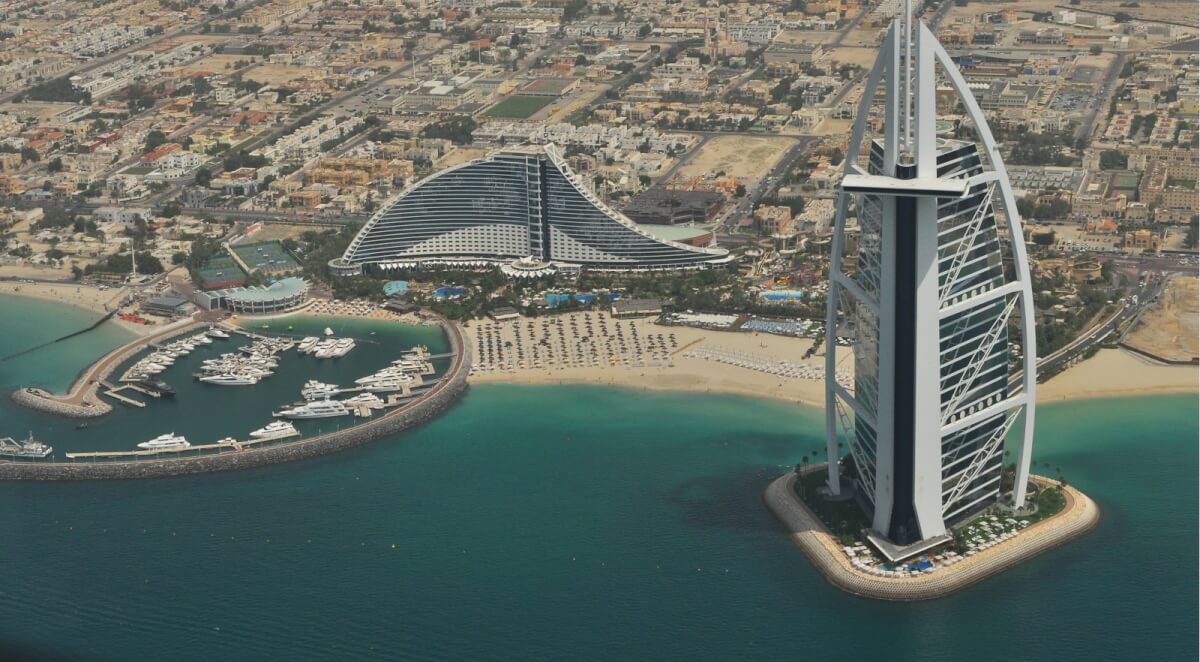Moving to the United Kingdom from Australia
Guide to moving to the United Kingdom for Australians

Whether you’re starting a new job or setting off on an exciting adventure, Dubai is like no other place in the world.
In this complete relocation guide you’ll learn all of the ins and outs of what it’s like to live in Dubai. Below you’ll find tips on landing new accommodations and employment, steps to set up bank accounts and health insurance, and the typical cost of living.
Before moving to Dubai, here’s a snapshot of some basic statistics you should know:
Before moving to Dubai, it’s important to make sure your paperwork is in order. You’ll need to have a passport that’s been valid for at least six months prior to entry and not due to expire during your stay. If you’re coming from the US, UK, Canada or most of Europe you can obtain a visa on arrival. You’ll also want to make sure any additional documents, like marriage licenses, bank statements or diplomas, are certified prior to entering the country.
There are a few types of visas that will allow you to enter the country for an extended or permanent stay. If you don’t have a job prior to entering, the long-term multiple visit visas will allow you to stay in the country for 90 days with the possibility of reapplying after the time has expired. If you do have an employer set up, they'll typically handle all of the paperwork for your work permit and visa. This can be done either before you enter the country, or you can change your visa status from visiting to work once you’ve crossed the border. It’s smart to check with the official General Directorate of Residency and Foreigners Affairs office of Dubai if your situation is a bit more detailed.
You’ll need to have an updated passport photo of yourself for a work visa and will likely have to pay a fee to change your visa status. If you plan on moving your family with you, Dubai also requires proof that you have a salary of at least Dhs 10,000 per month before you can obtain an entry permit for your loved ones.
And remember, you'll need a sponsor to enter Dubai regardless if it’s for a quick visit or for a permanent relocation. This could simply be your hotel or tourist company, your future place of employment, or a friend or family member who’s a permanent UAE resident.
Citizens from Australia, the EU, UK, or US can visit Dubai for 30 days without making advance arrangements. After disembarking from a flight, your passport will be stamped with a 30-day visit visa. To stay beyond this visa, a residency visa is required. This can either be taken care of through an employer, a family member who already lives in Dubai, or by meeting certain other criteria. There's also an investor residence visa, which means that if you invest Dhs 70,000 (£14,500) in a UAE company and pays a Dhs 300 fee, you’re eligible to receive a three-year visa.
Students in the UAE must carry a student visa, which is generally granted for one year. It can be renewed annually through their program of study. To receive the visa, students need to provide a passport, photos, a letter of acceptance to a UAE educational institution, and a tenancy agreement, if they have one. Applicants for this visa may also be required to undergo a security check and take a medical test for tuberculosis, HIV and hepatitis B or C.
For most things, the cost of living in Dubai is much lower than cities like London or New York. Here are a few basic costs for typical living in Dubai:
| Good or service in Dubai | Approximate cost |
|---|---|
| Average Monthly Rent | Dhs 7,300 |
| Fuel | Dhs 6.89 per gallon |
| Average Restaurant Meal | Dhs 30 |
| Cinema Ticket | Dhs 35 |
Opening a bank account in Dubai is pretty simple. There are over 45 UAE-based commercial banks to choose from. There are also a handful of bank branches from regions like London, Germany and China. You must be a resident to open a checking account, but some banks allow non-UAE residents to open a savings account. You'll also need to bring copies of your passport, any residency or work permits, and if you already have an employer, a letter confirming your salary.
Remember that whether you’re there as a permanent expat, or for temporary work or school, you and your family can save money on cross border transfers through Wise.
Working in Dubai can be financially rewarding, no matter where in the world you’re from. There's no personal tax, so net income is generally much higher than other countries. As a Muslim country, the weekly day of rest is Friday, and some companies work from Sunday to Thursday, with Friday and Saturday as their weekend. During the holy month of Ramadan, working hours are reduced to six hours; however, a typical work day is from 8:30am to 5:30pm.
It’s recommended to find work prior to entering Dubai, as many new employees are recruited abroad from head-hunters or employment agencies. If you haven’t already landed a job prior to entering the country, here are a few English-speaking sites to help you:
It can be daunting finding a place to live when moving to a new country. Many Dubai employers will provide accommodation or have extra living expenses built into contracts for their new recruits. It’s also not uncommon to purchase a home rather than rent. If you're renting, many apartments or condos will likely come furnished, but it’s not too difficult to find a place without furniture. Most landlords will require you to pay either six months to a full year of rent upfront, so be prepared for that large transaction.
The districts of Jumeirah and Dubai Marina are more expensive and rental property is competitive, as they're close to the beach and highly desirable. The Arabian Ranches also have a good reputation for well-built homes and can be at the high end of the market. There are somewhat less expensive districts such as The Lakes, The Meadows, and The Springs. And if you’re up for the commute on the famous Sheikh Zayed Road, the longest highway in the UAE, there's always room in the suburbs.
There are public hospitals which offer free or very low-cost services to Dubai residents. You’ll need to have a health card to be treated at one of these hospitals which is available from the Department of Health and Medical Services.
Dubai employers are required to provide health insurance coverage for their employees and sponsors are required to get insurance cover for their resident dependants. You’ll have a few insurance companies to pick from, if you don’t already have insurance coverage from home.
Arabic is the official language of Dubai and the UAE. However, English is used by most of the residents. You’ll also find Hindi, Chinese or Urdu commonly spoken because of the high volume of foreign visitors.
If you want to brush up on your Arabic, there are free online classes available. Learners commonly turn to either Duolingo or Madinah Arabic. You can also find local language classes at universities or schools around Dubai.
You’ll find several forums and meetups for connecting with expats in Dubai:
Here are the important emergency contacts in Dubai:
Dubai is like no other place in the world, filled with travelers from all over the globe. There’s a lot to take care of when relocating to another country, but the process is certainly worth it if you’re looking for a new adventure.
*Please see terms of use and product availability for your region or visit Wise fees and pricing for the most up to date pricing and fee information.
This publication is provided for general information purposes and does not constitute legal, tax or other professional advice from Wise Payments Limited or its subsidiaries and its affiliates, and it is not intended as a substitute for obtaining advice from a financial advisor or any other professional.
We make no representations, warranties or guarantees, whether expressed or implied, that the content in the publication is accurate, complete or up to date.

Guide to moving to the United Kingdom for Australians

Are you pregnant? Congratulations - this is one of the most exciting periods of your life. But if you’re living abroad as an expat, visitor, or non-resident...

If you’re expecting a new baby, you’re probably experiencing a range of emotions - excitement, apprehension, joy, and confusion. If you’re a visitor or expat...

Home to some of the world’s best museums, restaurants, sports teams, and universities, there’s no doubt that moving to the UK to work, study, or just to have...

The United Kingdom is rich with history and tradition. A destination wedding in the UK is sure to be an extraordinary event for you and your loved ones. From...

The UK is the fifth largest economy on the planet, with a highly developed technology and service industry. London is also the world’s leading financial...